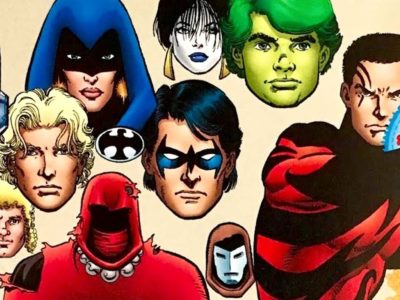
[ad_1]
Warning: The following contains spoilers for Supergirl: Woman of Tomorrow #7, on sale now from DC Comics.
Supergirl: Woman of Tomorrow (by Tom King, Bilquis Evely, Matheus Lopes, and Clayton Cowles) serves up a classic knight-errant questing story within a wide-ranging science fiction universe. Supergirl is hired by an alien girl seeking vengeance upon the man who killed her father. For Supergirl, this is personal when the killer also gravely wounds Krypto. Their journey takes them from planet to planet in chase of the killer, Krem of the Yellow Hills, and the ship of brigands he has joined. Yet, the greatest tragedy of the series might not be the pain the villains inflict but the pain of restraint that a hero must endure.
In narration, supplemented with images of Supergirl beaten and subdued aboard the Brigand’s ship, the alien girl Ruthye recollects: “I told her once, that she, who lost everything to holocaust, must so hate the Brigands who bring genocide with a smile. She considered this. ‘I’m Supergirl. I don’t hate anyone.’ She smiled politely, and she moved on. And I learned then that up can be down and right can be wrong, and a lie told well can be true and good.” The series so far has been a parade of events asking this very question in different forms: how can a hero face such evil and not hate those who cause it?
The story in issue #7 is titled “Hope, Help, and Compassion,” and Supergirl represents all three. The nature of a hero is not defined by their actions alone but what the promise of their presence means for those in need. Supergirl’s reputation proceeds her and it’s not something she can risk damaging. That promise of help, the very nature of hope, is part of the hero’s toolkit, and it enables people to hold on just a bit longer, to resist the evil around them, and to fight in the stead of the hero that is awaited.
Supergirl finds it critical that she not be seen as having a vendetta against those she opposes. For even those she confronts, she could potentially redeem. There must be hope even for them. Wielding immense power, Supergirl (representing the rest of the superheroes) must be seen to have restraint and operate in fairness and mercy. If she fails to do so, she risks her reputation soured by the onlookers’ doubts: “What if that were me?”
In the first issue, Ruthye begs Supergirl to kill Krem of the Yellow Hills to which Supergirl replies “And the first rule of that job just happens to be ‘Don’t kill people’ . . . It’s like my mother said—life is about compassion, not fury.” The lesson Supergirl hopes to teach Ruthye is the very one she must work to learn herself.
This question is one that Ruthye returns to over and over. In the second issue, she asks, “After the tragedy of your planet’s destruction . . . Did you too seek to avenge the death of your family?” to which Supergirl replies, after a moment of pause, “No, I didn’t.” Ruthye comments in the narration, “I heard her response . . . I heard a whole life of regret.” Perhaps Ruthye simply cannot understand how a hero isn’t burdened by the same tumult of emotions that normal people feel in the face of violent loss. The answer that she comes to later is that heroes aren’t excluded from that emotion, and Supergirl feels the desire for vengeance as much as anyone else. Yet, her decision to not give into that is then followed by perhaps a more tragic emotion: regret. Supergirl, years later, is unsure if her decision to not seek vengeance upon those who killed her family and people was the right one. Perhaps, her pause communicates that she wonders how life would’ve been different if she hadn’t been self-governed by restraint.
This challenge is borne by many heroes. The viciousness and cruelty they see exhibited by the villains they confront must enrage them. At times, it must shock them. As King demonstrates in Heroes in Crisis, some heroes have the images of the tragedies they have seen burned into them, haunting their every moment. So, to then turn and face more villains and maintain restraint must be excruciating for some of them. With each planet, the atrocities of Krem and the brigands grow more visible and disturbing. Supergirl appears to grow stunned at the cruelty Krem’s crew has executed until they encounter a straggler of the group awaiting execution by mob on a planet. Ruthye wonders, “I know he surely deserved his fate. But I had some thought you’d save him.” Overlooking his recently deceased corpse, Supergirl mutters, “Did you?”
Overwhelmed by the villains’ cruelty, Supergirl flies into a star so she can release all of her rage and not damage anything—she’s afraid of her own power in the midst of her red-hot emotions. Each issue returns to the question Ruthye wonders: “Do you hate?” While Supergirl’s words say one thing, her actions say something altogether different. As Ruthye remarks, “Every moment of every day, she suppressed the forces churning inside of her. All the energy of a dead world that strained against her many barriers, eternally demanding to be released. I believe this effort hurt her. I believe she lives her life in pain.” These emotion filled issues demonstrate that an entire layer of being a hero involves constant suffering that must be endured in order to be better than those they confront.
About The Author
[ad_2]





